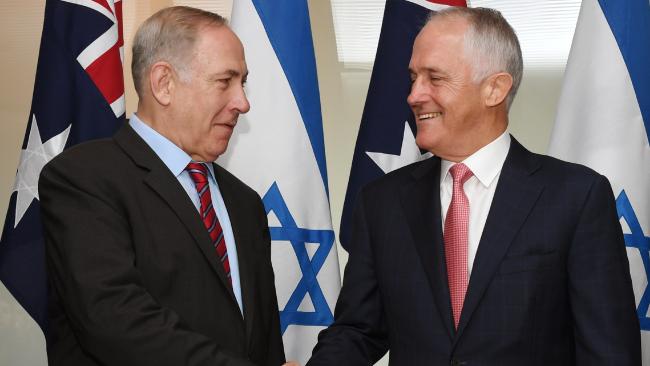As a result of last week’s first visit to Australia by a sitting Israeli Prime Minister, it is possible to discern a more complete grasp by both sides of their shared strategic interests that go beyond resolving the difficult, complex and often emotional Israeli — Palestinian issue.
This was made clear in the joint statement issued by Benjamin Netanyahu and Malcolm Turnbull. Violent extremism is a serious common concern for both states. Both leaders stressed the importance of strengthening co-operation to combat terrorism.
Israel is a prime source of effective counter-terrorism techniques and procedures. There’s scope for both countries to share information on terrorist financing, foreign fighters, the connections between Middle East terrorism and violent Islamist extremism in Asia.
The threats and risks in cyberspace aren’t diminishing — they’re growing in pace, scale and reach. Israel has world-class expertise in cybersecurity. Both countries’ militaries are focused on how to incorporate cyber capabilities into military operations.
The two leaders have committed to a bilateral cyber dialogue. Apart from the military interest, this could examine issues such as internet governance, cybercrime, cyber regulations, information- sharing between government and business, capacity-building and incentives for industry.
Most significant, both leaders affirmed the importance of bilateral defence co-operation and agreed to review opportunities to enhance exchanges between our defence agencies. This is long overdue. There’s been almost no high-level military exchanges between the two countries. Neither side sends officers to study at their military staff colleges. Our defence attache to Israel is based in Turkey.
The Australian and Israeli militaries both operate American equipment. Israel, whose military doctrine is based on self-reliance, can learn from Australia’s experience in military coalitions.
Israel has experience in urban warfare and in the development of unmanned aerial systems an area in which our air force is developing its capability. Israel is a global pacesetter in active measures for armoured vehicle protection, defence against short-range rockets and use of robotics in the battlefield.
Both countries are close to major choke-points along maritime oil and trade routes, making naval affairs an important component of both states’ national strategies. Australia and Israel are both focused on the undersea domain, submarines and deterrence, including the future development of undersea technologies, particularly unmanned subsurface vehicles, notwithstanding the obvious and significant differences in their geographical capability drivers.
Read the full article by Anthony Bergin in The Australian.

